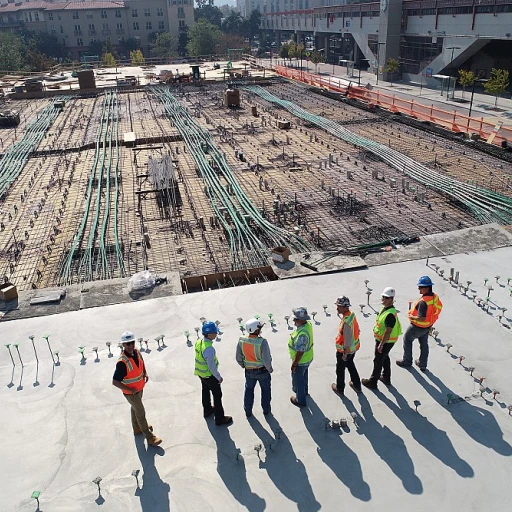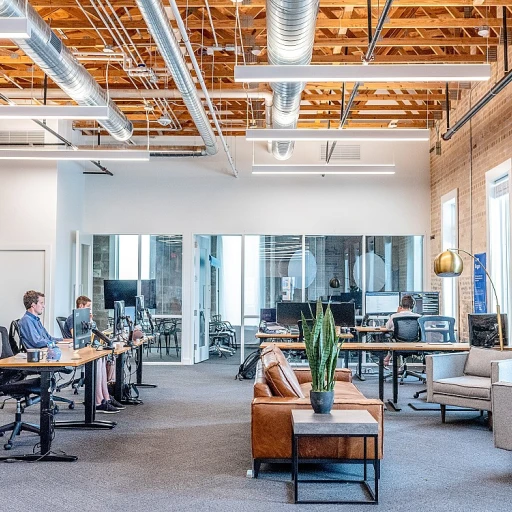
Understanding the Concept of an Intelligent Workplace
Defining the Smart Work Environment
An intelligent workplace is more than just a buzzword; it represents a transformative shift in how companies operate today. This transformation is largely fueled by advancements in technology and changes in cultural dynamics. At its core, an intelligent workplace utilizes a symbiotic relationship between human skills and cutting-edge technology to drive productivity and enhance the employee experience.
The Essence of Interconnected Workplaces
Interconnected systems and solutions form the backbone of an intelligent workplace. Through the integration of tools such as cloud computing, data analytics, and artificial intelligence, UK companies are revolutionizing the traditional office environment. These technologies enable real-time decision-making and streamline daily tasks, reducing dependencies on outdated processes and traditional search methods.
Human-Centric Design and Culture
While technology is a crucial component, the human element remains at the forefront. Intelligent workplaces prioritize employee engagement, emotional intelligence, and the overall well-being of staff. By adopting hybrid work models and implementing flexible policies, organizations create a supportive environment that fosters creativity and efficiency. For further insights into understanding crucial workplace transformations, take a look at exploring effective executive reporting in UK companies.
Technological Advancements and Capabilities
An intelligent workplace often harnesses technologies like booking software and intelligent search systems to improve knowledge management and foster a collaborative culture. Powered by artificial intelligence and machine learning, these tools streamline workflows and enhance the employee experience by reducing time spent on repetitive tasks and increasing availability of necessary workplace resources.
The Role of Technology in Creating an Intelligent Workplace
The Impacts of Workplace Technology on Efficiency
The evolution of workplace technology has dramatically transformed how offices operate in today's digital landscape. Leveraging intelligent systems and automation tools can significantly enhance productivity and streamline tasks. From data analytics to machine learning, such technologies optimize decision making and improve employee experience, leading to a more efficient work environment.
Role of Artificial and Emotional Intelligence
Integrating artificial intelligence (AI) and emotional intelligence into the workplace helps create a more intelligent workplace by providing real-time insights and enhancing employee well-being. AI enables precise knowledge management and personalized employee interactions through intelligent search systems. Meanwhile, emotional intelligence fosters better human interactions within hybrid work structures.
Optimizing Tasks with Digital Tools
Digital tools, such as cloud computing and booking software, assist in managing workplaces more effectively. These technologies facilitate hybrid work setups, allowing employees to maximize flexibility and address workplace challenges proactively. To learn more about optimizing management processes in this digital age, consider exploring our blog on executive reporting strategies.
Cultural Shifts Towards an Intelligent Workplace
Adapting to New Workplace Dynamics
The transformation towards an intelligent workplace in the UK involves harnessing both cutting-edge technologies and evolving workplace cultures. As UK companies navigate this shift, the workplace culture itself becomes a strong pillar supporting this transition. Smart technologies, such as workplace technology and digital tools, are not only improving the physical office environment but also shaping the cultural landscape of businesses.
One significant aspect is the integration of emotional intelligence and artificial intelligence to foster a more inclusive and engaging work environment. By leveraging technologies that facilitate real-time data analytics and intelligent search, UK companies can tailor solutions that resonate with diverse employee needs, subsequently enhancing the employee experience.
The adoption of a hybrid work model requires a paradigm shift in the traditional work culture. As employees split their time between remote and in-office work, companies must bridge the gap through efficient knowledge management systems. This shift necessitates a culture of flexibility and adaptability, encouraging employees to optimally adjust their work patterns in line with intelligent workplace strategies.
Furthermore, as employees engage with smart booking software and other digital workplace solutions, the role of human intelligence in fostering a collaborative and productive atmosphere cannot be understated. Organizations must prioritize employee engagement by promoting an open culture where feedback and continuous learning are ingrained in their ethos.
This dynamic shift towards an intelligent workplace culture is fundamental in addressing challenges UK companies face while implementing sophisticated workplace systems. By nurturing a workplace culture innovative enough to embrace cloud computing and machine learning, companies prepare themselves not just to keep pace with technological advancements, but also to lead them. As such, achieving seamless integration between traditional practices and new-age technologies, as seen in systems like Bill.com and Sun Accounting Software, becomes a practical example of this evolution. To explore how Bill.com can work seamlessly with Sun Accounting Software, you can read more here.
Employee Engagement and Well-being in an Intelligent Workplace
Enhancing Employee Experience and Building a Smart Work Environment
An intelligent workplace should prioritize employee experience as a key factor in boosting productivity and overall work satisfaction. The fusion of technology with human intelligence enables a seamless work environment that can positively influence employee engagement.
One of the most notable changes in smart workplaces is the emphasis on hybrid work models supported by smart technology solutions. Tools such as booking software and digital platforms allow employees to manage their tasks more effectively, providing them with the flexibility to work remotely without compromising communication or productivity. This shift towards a digital workplace helps integrate various workplace technologies that facilitate intelligent search systems, knowledge management, and data analytics for better decision making.
Cloud computing and real-time data access have become indispensable in enhancing the employee experience in an intelligent workplace. These systems enable employees to access work resources and collaborate without the need for traditional search methods, while maintaining organizational efficiency. Moreover, machine learning and artificial intelligence have revolutionized many work environments by automating repetitive tasks, allowing employees to focus on more strategic and value-added activities.
Another critical component of building a productive and intelligent office involves improving emotional intelligence in decision-making processes. By fostering a culture that encourages transparency and feedback, businesses can improve employee well-being and interpersonal connections. This becomes particularly crucial in ensuring that a workplace operates harmoniously amidst the integration of digital tools and human-centered design approaches.
While technology plays a pivotal role in implementing intelligent workplaces, its success largely depends on how effectively it aligns with the company's cultural shift towards a more adaptive and agile work environment. Creating intelligent workplaces is an ongoing process that requires continuous assessment of workplace strategies adeptly integrating human intelligence and technological advances.
Challenges Faced by UK Companies in Implementing Intelligent Workplaces
Barriers to Adoption and Integration of Smart Solutions
UK companies face several challenges when implementing intelligent workplaces. One primary concern is the integration of new technologies with existing systems. Legacy systems may not support modern workplace technology seamlessly, leading to significant overhead costs for updates and replacements.Data Management and Privacy Concerns
The implementation of intelligent workplace solutions involves the collection and analysis of large volumes of data. While data analytics can enhance productivity and decision-making, there is an inherent risk of data breaches and privacy violations. Companies must invest in robust security protocols to protect employee information, while also ensuring compliance with regulations such as the UK's GDPR.Balancing Human and Artificial Intelligence
Intelligent workplaces leverage tools like machine learning and artificial intelligence to optimize tasks. However, the value of human intelligence cannot be overstated. Balancing the use of machine learning with emotional intelligence is crucial to prevent over-reliance on automation. Employees should feel empowered by technology, not replaced.Cultural and Organizational Resistance
Cultural shifts, which encourage the adoption of digital workplaces, often encounter resistance within organizations. Employees and management may be wary of change. Effective change management strategies are vital to address concerns and help ease the transition.Resource Constraints and Skill Gaps
Deploying intelligent workplace systems requires considerable financial investment. Many UK businesses, particularly SMEs, struggle to allocate necessary resources. Additionally, the skill gap in digital literacy can hamper the effective use of new workplace tools and technologies, calling for investment in employee training. Despite the challenges, it's clear that adapting work environments to become more intelligent can lead to improved employee experience and productivity. Embracing these technologies thoughtfully and strategically ensures businesses can thrive in an evolving landscape.Future Trends in Intelligent Workplaces for UK Companies
Emerging Technologies Shaping the Future
The future of intelligent workplaces in the UK is closely tied to the rapid evolution of technology. As companies continue to integrate advanced tools, the landscape of work is set to transform significantly. Technologies like artificial intelligence and machine learning are expected to play a pivotal role in enhancing decision-making processes and automating routine tasks. This not only boosts productivity but also allows employees to focus on more strategic initiatives.
Hybrid Work Models and Flexibility
The shift towards hybrid work models is another trend that is gaining momentum. With the rise of digital workplaces, employees now have the flexibility to work from various locations, which can lead to increased job satisfaction and improved work-life balance. This flexibility is supported by workplace technology such as cloud computing and intelligent booking software, which facilitate seamless communication and collaboration across different environments.
Focus on Employee Experience and Well-being
As discussed earlier, employee engagement and well-being are crucial components of an intelligent workplace. Future trends indicate a growing emphasis on creating a supportive work environment that prioritizes emotional intelligence and mental health. Companies are likely to invest in tools and systems that provide real-time data analytics to monitor and enhance the employee experience, ensuring that their workforce remains motivated and productive.
Data-Driven Decision Making
Data analytics will continue to be a cornerstone of intelligent workplaces. By leveraging data, companies can gain insights into employee behavior, workplace efficiency, and overall business performance. This data-driven approach enables organizations to make informed decisions that align with their strategic goals, ultimately leading to a more efficient and intelligent work environment.
Challenges and Opportunities
While the future holds promising opportunities, UK companies may face challenges in implementing these intelligent solutions. Issues such as data privacy, cybersecurity, and the need for continuous employee training are likely to arise. However, by addressing these challenges proactively, businesses can harness the full potential of intelligent workplaces and maintain a competitive edge in the ever-evolving market.


-large-teaser.webp)










